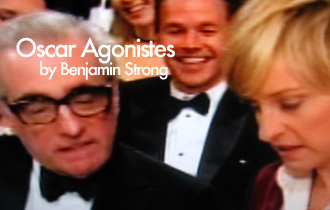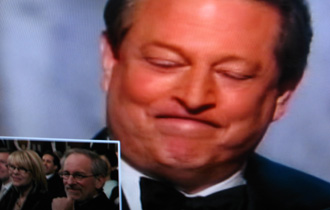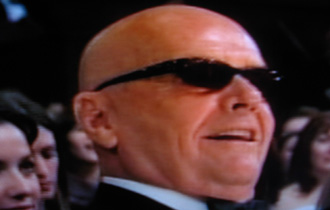Oscar Agonistes: The 2007 Academy Awards Take 2
26.02.07
 Ever since a mediocre B-film actor ascended to the White House two decades ago in a fake tan, conventional wisdom has held that our politics crib rather too heavily from the movies. But on the evidence of last night’s 79th Academy Awards ceremony, the balance of influence has changed direction, and Hollywood has begun to plagiarize the staid dress code, bland, mawkish plotting, and robotic countenances that typify the Washington D.C. theatrical style. Karl Rove must have blushed.
Ever since a mediocre B-film actor ascended to the White House two decades ago in a fake tan, conventional wisdom has held that our politics crib rather too heavily from the movies. But on the evidence of last night’s 79th Academy Awards ceremony, the balance of influence has changed direction, and Hollywood has begun to plagiarize the staid dress code, bland, mawkish plotting, and robotic countenances that typify the Washington D.C. theatrical style. Karl Rove must have blushed.
It is a truth universally acknowledged that every Oscars is the most boring ever, but this year’s edition was unique among the thirty-plus I have watched for its total discipline in staying on message. How appropriate then that the only fun all evening was had at the expense of Al Gore, who, when egged by Leonardo DiCaprio to announce that he was going to run for president again, got curtailed by the orchestra. Gore was in on the joke of course — that he was being treated like a director of animated shorts or a foreign-speaking costumer guilty of exceeding his allotted stage time. But really, wasn’t he just being treated as the former next president of the United States (as he likes to call himself)? The win last night for best documentary notwithstanding, Gore embodies the sad sack condition of American democracy: he is the people’s choice, but a choice revocable by invisible authorities stationed in the wings.
Funny stuff maybe, but this is gallows humor.
 That inconvenient facts have been silenced was the show’s recurring theme — and not just the effects of global warming, or the discrepancy between the Electoral College and the popular vote. The greatest anxiety pervading the Kodak Theater was for Liberal Hollywood’s own disenfranchisement, its dawning recognition of the wilted cultural authority it has when Third Worlders and David Lynch can make better, more profitable movies with crappy digital cameras and no studio interference.
That inconvenient facts have been silenced was the show’s recurring theme — and not just the effects of global warming, or the discrepancy between the Electoral College and the popular vote. The greatest anxiety pervading the Kodak Theater was for Liberal Hollywood’s own disenfranchisement, its dawning recognition of the wilted cultural authority it has when Third Worlders and David Lynch can make better, more profitable movies with crappy digital cameras and no studio interference.
For his part, Gore was likely thinking about the tithes Senator Barack Obama was in town to collect earlier in the week, and he tried to soothe the fragile egos of the talent in the room (“I’m just here for the movies, Leo”). But the former vice president’s symbolic castration lingered in the mind when, later in the evening, ex-producer Sherry Lansing accepted a humanitarian award and announced quite unconvincingly that, “We work in a culture where we are encouraged to speak out.” (If that were remotely true, Mike Judge’s Idiocracy might have been up for best picture last night, a movie Fox dumped into theaters last fall in a release so limited that it never played on a single New York City screen.) Lansing was far more credible in stumping for Tinseltown when her speech fell into recognizably Gipper-derived oratory: “I have met school teachers who work against insurmountable odds, and yet they never stop trying to reach our children. They are my personal heroes.”
 Martin Scorsese — who once stood among the vanguard of the young filmmakers that emerged in the 1970s — used to be one of my personal heroes. Consequently, the most dispiriting aspect of last night was the sight of Scorsese nabbing a trophy for a remake of a far superior Hong Kong policier that he and screenwriter William Monahan could only bring themselves to mumblingly credit. After a decade of prestige flicks that have steadily diluted the legacy of a once admirable career — and given the feeble competition — Scorsese’s pity fuck from the Academy was a foregone conclusion, but for those who still didn’t see it coming, three of his contemporaries — Francis Ford Coppola, George Lucas, and Steven Spielberg – walked on to the stage to present the award for best director.
Martin Scorsese — who once stood among the vanguard of the young filmmakers that emerged in the 1970s — used to be one of my personal heroes. Consequently, the most dispiriting aspect of last night was the sight of Scorsese nabbing a trophy for a remake of a far superior Hong Kong policier that he and screenwriter William Monahan could only bring themselves to mumblingly credit. After a decade of prestige flicks that have steadily diluted the legacy of a once admirable career — and given the feeble competition — Scorsese’s pity fuck from the Academy was a foregone conclusion, but for those who still didn’t see it coming, three of his contemporaries — Francis Ford Coppola, George Lucas, and Steven Spielberg – walked on to the stage to present the award for best director.
For the sake of sustaining an illusion of suspense fellow nominee Clint Eastwood couldn’t join them, but the more telling absence on that stage was Robert Altman, who died last fall just months after receiving an honorary Oscar. Altman, who was older than this group (81 when he passed away) was middle-aged when the studios finally gave him his break. But he came of age artistically at the same time as Scorsese et al, and he increasingly appears to be the conscience of their generation. Altman liked to give the finger to the Potomac (his masterpiece was the campaign mockumentary series Tanner ’88), but to the grave he never showed any respect for the Hollywood establishment either. On the strength of occasional commercial successes, he was able to use the comparatively meager budgets the studios allowed him to film small personal gems like The Prairie Home Companion. In contrast, Scorsese — who once got all up in the face of the multiplex with his angry loners—has been desperate to join the club that until last night didn’t want him as a member.
It may be a cliché to regard the 1970s as the final golden age for American movies, but more and more that cliché sounds incontrovertible. Surely, it is no coincidence that America’s political left hasn’t been very vital either since that era. The Departed was an ideal choice to fete on a night when nominees who did their best work thirty years ago were belatedly acknowledged and Hollywood’s capacity to do the rudimentary aspects of its job — like, you know, entertaining us — had vanished.